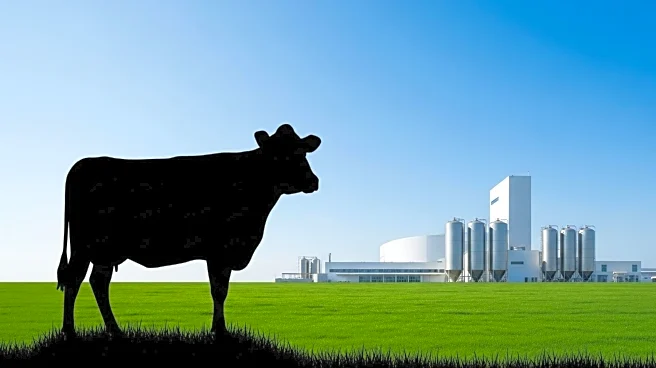What's Happening?
Algeria has announced a significant development in its agricultural sector with the construction of the world's largest integrated dairy and powdered milk production facility, a $3.5 billion project in collaboration with a German company. This initiative aims to address food security challenges in the country, which, despite its wealth in oil and gas, struggles with producing sufficient food in its arid climate. The facility is expected to produce a substantial amount of milk powder, a product that has seen fluctuating demand over the years. In the United States, particularly in the western regions, dairy producers like Norm Dinis of Empire Dairy in Wiggins, Colorado, do not anticipate a significant impact on their exports due to the current market glut of milk powder. The U.S. dairy industry has seen a shift in consumer preferences towards whole milk, whey, and protein products, leaving milk powder as a less desired commodity.
Why It's Important?
The establishment of this dairy facility in Algeria highlights the strategic importance of agriculture in ensuring national security and self-sufficiency, especially in resource-rich but food-insecure regions. For the U.S. dairy industry, this development underscores the global interconnectedness of agricultural markets and the need to adapt to changing consumer demands. While the Algerian facility is unlikely to affect U.S. exports significantly, it serves as a reminder of the competitive and dynamic nature of the global dairy market. The U.S. dairy sector continues to innovate and cater to domestic and international demands for high-protein and specialty dairy products, which are increasingly popular among consumers.
What's Next?
As Algeria progresses with its dairy facility, the U.S. dairy industry will likely continue to monitor global market trends and consumer preferences. The focus may remain on diversifying product offerings and enhancing production efficiency to maintain competitiveness. Additionally, the U.S. may explore opportunities to collaborate or share expertise with emerging dairy markets like Algeria, potentially opening new avenues for trade and cooperation.
Beyond the Headlines
The development of Algeria's dairy facility also raises broader questions about sustainable agricultural practices in arid regions and the role of technology in overcoming environmental challenges. The U.S. dairy industry, with its experience in managing large-scale operations in diverse climates, could offer valuable insights into sustainable practices that balance productivity with environmental stewardship.








